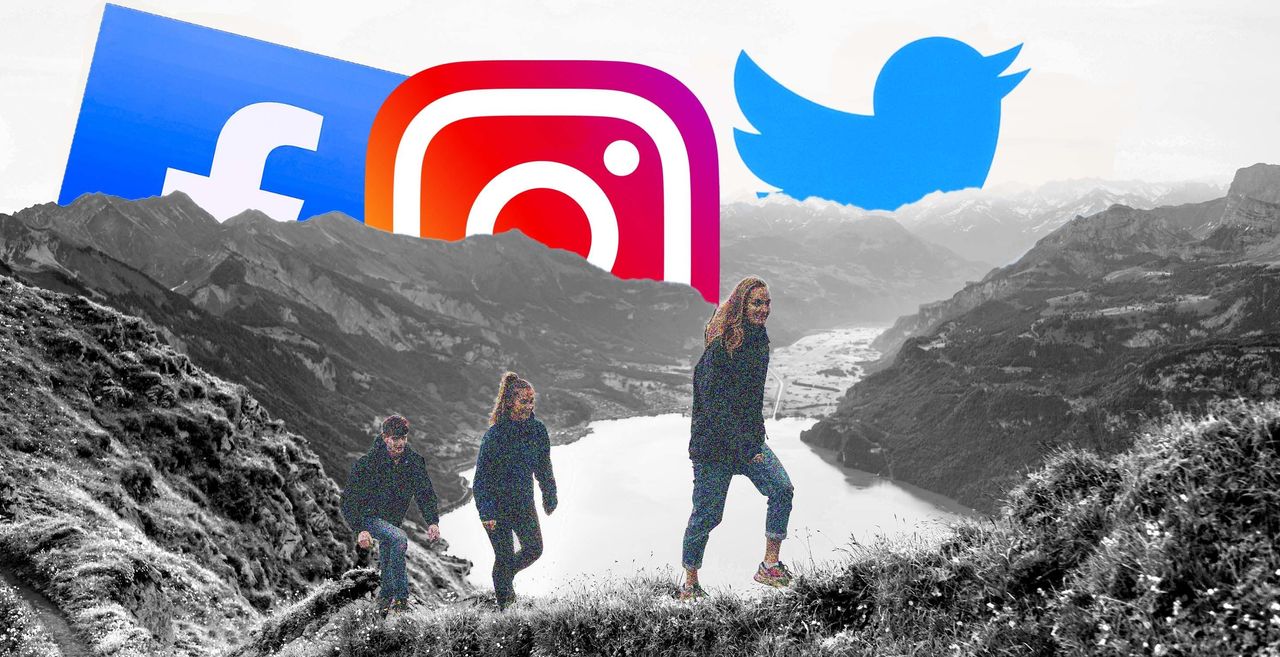Quitting Twitter? What People Say About Life After Social Media
How does it feel to flee from the feeds? Mostly worth it, say people who ditched Twitter, Facebook and Instagram.
When Twitter Inc. accepted Elon Musk’s $61 billion offer to buy the social-media company, many frequent tweeters vowed to deactivate their accounts. For a while, it seemed like everyone on Twitter was talking about quitting Twitter.
Not too long ago, people said they would flee Instagram. Before that, it was Facebook.
With every social-media controversy, people talk about shutting down their accounts forever. Few actually do it. Roughly 70% of Americans used social media in 2021, a level that remained steady for five years, according to a Pew Research Center survey. Meta Platforms Inc. in February reported Facebook’s daily active users fell for the first time in at least a decade, but it said Wednesday that population was growing again.
Social-media apps are crafted to keep people coming back. The dopamine rush that comes from other people’s likes can leave you feeling celebratory. But there is a downside. The constant exposure to other people’s lives can hurt your body image, sleep, anxiety levels and productivity.
“Those feelings drive people to consider how much time, if any, they want to spend on social media,” said Kate Rosenblatt, senior clinical manager at Talkspace, an online therapy company.
Many people who have left Twitter, Facebook and Instagram say they are happier because of it, but they also realized they miss some things. Here is what they want others to know—both the good and the bad.
Withdrawal fades quickly.
When you’re used to checking an app every day, or multiple times a day, you sometimes mindlessly open the app and scroll through your feed.
“I was so sucked into the negative memes, clapbacks and spirals of conflict I saw on Twitter that when I first left, my muscle memory told me to open the app and start scrolling,” said Kimberly Katiti, a 28-year-old artist in North Hollywood, Calif., who quit the platform in April 2021.
“I got over that within a week,” she said. “I would just put my phone away. And before I knew it, I wasn’t getting the urge to scroll and see what’s happening in the world.”
You’re still connected to the world.
Social media started as a way to connect with friends, but the platforms evolved to become places for companies and people to share news and politics—Mr. Musk called Twitter the world’s “de facto town square.” But with that increased role came misinformation and other issues. Cutting social media out of your life may nudge you to find other sources for news. And just because you’re not on Facebook doesn’t mean you’ll miss big cultural moments and trends.
“I got on Twitter in 2008 because it was a different and newer communication method,” said Christopher Britton, a 34-year-old who runs a marketing business in Inlet Beach, Fla. “At the time, I worried about not being so-called relevant.” He deleted his Twitter account in 2011, and now keeps informed via Reddit, Apple News and other sources.
“And my Messages app is just as good as any social-networking site when keeping in contact with people I know,” Mr. Britton said.
People are nicer.
You don’t have to be on social media for long to encounter Facebook rants or Twitter feuds where people you know communicate differently than they do in person. When you no longer see those posts and instead interact with people in real life, your views can change.
“It’s so much easier to post rude stuff when you’re behind a keyboard wall,” said J.J. Garcia, a 54-year-old business analyst in New Braunfels, Texas. “But in person, your neighbors seem less inclined to talk about that stuff. And you can get along with them better when you’re not seeing all their opinions online.”
You might have trouble sending or donating money.
On Facebook, you can add your payment information to buy and sell items on Marketplace, send money to family on Messenger and donate directly to causes. Leaving Facebook can make that more cumbersome, said Bobby Buchler, a 57-year-old retired high-school teacher from Las Vegas who ditched the social network in 2019.
“On Twitter, I follow organizations that rescue dogs. And they make posts saying to donate on Facebook, or they link to a post made on Facebook,” Mr. Buchler said. “But I can’t easily check it because I don’t want to go on Facebook.”
People don’t miss you—or remember your birthday.
Kristen Womack was active on Facebook and Instagram, running groups, sharing articles and operating a small-business account. But when she left Facebook in 2016 and Instagram in 2020, no one seemed to notice.
“Not one single person said, ‘Oh, wow, I don’t see you on Facebook or Instagram anymore. I miss you,’” said Ms. Womack, a 42-year-old product manager at Microsoft Corp. in Minneapolis. “Once you leave the party, it’s like you’re not missed.”
And those birthday reminders and comments on your Facebook wall? Say goodbye to them. Though doing so may not be a bad thing.
“On Facebook on my birthday, 300 people would pop up, and then you have to respond and like comments from random people,” said Verlin Campbell, a 42-year-old IT project manager in Los Angeles. “Now my interactions are more genuine. On my birthday, like 20 people texted me. I’m happier with that.”
You feel more productive.
Leaving social media gives you more free time—sometimes more than you know what to do with.
“I was surprised to realize just how much time I wasted on scrolling. You hop on your computer to write, and it’s easy to get sidetracked,” said Lindsey Zitzmann. The 39-year-old online life coach in Villard, Minn., quit Instagram in 2020.
“Now, in those in-between times when I have a few minutes, I read books, I’m more present with family, or I’ll cook without picking up my phone,” she added.
Friends drift away.
Social media can make you feel like you’re in touch with people just because you double-tapped a post, or because someone commented on one of your photos. Once you leave, some of those relationships fade.
“It makes me sad to think about it,” said Oliver Murray, 18, of Fayetteville, Ark. The freelance digital artist says he lost contact with some online friends when he deleted his Instagram account in 2019. He now shares his artwork on Tumblr and Twitter, where he doesn’t feel pressure to post constantly.
“I got annoyed with all the superficial vanity posts,” he said. “The only way I’ll go back to Instagram is if Elon Musk ruins Twitter.”
Reprinted by permission of The Wall Street Journal, Copyright 2021 Dow Jones & Company. Inc. All Rights Reserved Worldwide. Original date of publication: May 5, 2022.
 Copyright 2020, Dow Jones & Company, Inc. All Rights Reserved Worldwide. LEARN MORE
Copyright 2020, Dow Jones & Company, Inc. All Rights Reserved Worldwide. LEARN MORE
This stylish family home combines a classic palette and finishes with a flexible floorplan
Just 55 minutes from Sydney, make this your creative getaway located in the majestic Hawkesbury region.
As Paris makes its final preparations for the Olympic games, its residents are busy with their own—packing their suitcases, confirming their reservations, and getting out of town.
Worried about the hordes of crowds and overall chaos the Olympics could bring, Parisians are fleeing the city in droves and inundating resort cities around the country. Hotels and holiday rentals in some of France’s most popular vacation destinations—from the French Riviera in the south to the beaches of Normandy in the north—say they are expecting massive crowds this year in advance of the Olympics. The games will run from July 26-Aug. 1.
“It’s already a major holiday season for us, and beyond that, we have the Olympics,” says Stéphane Personeni, general manager of the Lily of the Valley hotel in Saint Tropez. “People began booking early this year.”
Personeni’s hotel typically has no issues filling its rooms each summer—by May of each year, the luxury hotel typically finds itself completely booked out for the months of July and August. But this year, the 53-room hotel began filling up for summer reservations in February.
“We told our regular guests that everything—hotels, apartments, villas—are going to be hard to find this summer,” Personeni says. His neighbours around Saint Tropez say they’re similarly booked up.
As of March, the online marketplace Gens de Confiance (“Trusted People”), saw a 50% increase in reservations from Parisians seeking vacation rentals outside the capital during the Olympics.
Already, August is a popular vacation time for the French. With a minimum of five weeks of vacation mandated by law, many decide to take the entire month off, renting out villas in beachside destinations for longer periods.
But beyond the typical August travel, the Olympics are having a real impact, says Bertille Marchal, a spokesperson for Gens de Confiance.
“We’ve seen nearly three times more reservations for the dates of the Olympics than the following two weeks,” Marchal says. “The increase is definitely linked to the Olympic Games.”

Getty Images
According to the site, the most sought-out vacation destinations are Morbihan and Loire-Atlantique, a seaside region in the northwest; le Var, a coastal area within the southeast of France along the Côte d’Azur; and the island of Corsica in the Mediterranean.
Meanwhile, the Olympics haven’t necessarily been a boon to foreign tourism in the country. Many tourists who might have otherwise come to France are avoiding it this year in favour of other European capitals. In Paris, demand for stays at high-end hotels has collapsed, with bookings down 50% in July compared to last year, according to UMIH Prestige, which represents hotels charging at least €800 ($865) a night for rooms.
Earlier this year, high-end restaurants and concierges said the Olympics might even be an opportunity to score a hard-get-seat at the city’s fine dining.
In the Occitanie region in southwest France, the overall number of reservations this summer hasn’t changed much from last year, says Vincent Gare, president of the regional tourism committee there.
“But looking further at the numbers, we do see an increase in the clientele coming from the Paris region,” Gare told Le Figaro, noting that the increase in reservations has fallen directly on the dates of the Olympic games.
Michel Barré, a retiree living in Paris’s Le Marais neighbourhood, is one of those opting for the beach rather than the opening ceremony. In January, he booked a stay in Normandy for two weeks.
“Even though it’s a major European capital, Paris is still a small city—it’s a massive effort to host all of these events,” Barré says. “The Olympics are going to be a mess.”
More than anything, he just wants some calm after an event-filled summer in Paris, which just before the Olympics experienced the drama of a snap election called by Macron.
“It’s been a hectic summer here,” he says.

AFP via Getty Images
Parisians—Barré included—feel that the city, by over-catering to its tourists, is driving out many residents.
Parts of the Seine—usually one of the most popular summertime hangout spots —have been closed off for weeks as the city installs bleachers and Olympics signage. In certain neighbourhoods, residents will need to scan a QR code with police to access their own apartments. And from the Olympics to Sept. 8, Paris is nearly doubling the price of transit tickets from €2.15 to €4 per ride.
The city’s clear willingness to capitalise on its tourists has motivated some residents to do the same. In March, the number of active Airbnb listings in Paris reached an all-time high as hosts rushed to list their apartments. Listings grew 40% from the same time last year, according to the company.
With their regular clients taking off, Parisian restaurants and merchants are complaining that business is down.
“Are there any Parisians left in Paris?” Alaine Fontaine, president of the restaurant industry association, told the radio station Franceinfo on Sunday. “For the last three weeks, there haven’t been any here.”
Still, for all the talk of those leaving, there are plenty who have decided to stick around.
Jay Swanson, an American expat and YouTuber, can’t imagine leaving during the Olympics—he secured his tickets to see ping pong and volleyball last year. He’s also less concerned about the crowds and road closures than others, having just put together a series of videos explaining how to navigate Paris during the games.
“It’s been 100 years since the Games came to Paris; when else will we get a chance to host the world like this?” Swanson says. “So many Parisians are leaving and tourism is down, so not only will it be quiet but the only people left will be here for a party.”
This stylish family home combines a classic palette and finishes with a flexible floorplan
Just 55 minutes from Sydney, make this your creative getaway located in the majestic Hawkesbury region.






















